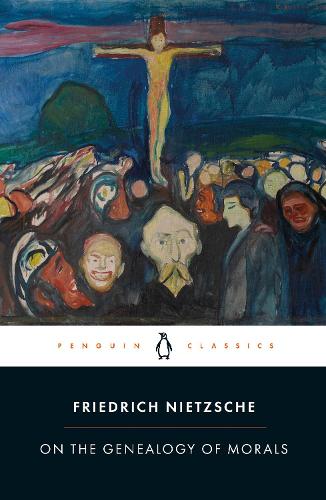On the Genealogy of Morals

Ratings/reviews counts are updated frequently.
Check link for latest rating. ( 34,479 ratings, 1,727 reviews)Read More
Found a better price? Request a price match

On the Genealogy of Morals
Book Hero Magic created this recommendation. While it's new and still learning, it may not be perfect - your feedback is welcome! IS THIS YOUR NEXT READ?
On the Genealogy of Morals
Features three essays that offer insights into Nietzsche's theories of morality and human psychology.
On the Genealogy of Morals explores issues at the very core of human nature in three powerful essays.
On the Genealogy of Morals is an essential work for understanding the philosophical revolution brought about by Friedrich Nietzsche. This profound and intellectually stimulating text is a companion to his earlier work Beyond Good and Evil, and it delves deeply into Nietzsche's radical ideas on human psychology and ethics. In a series of three essays, Nietzsche embarks on an incisive exploration of the origins and meanings of our moral concepts. Rather than providing a linear narrative, this book offers a series of thought-provoking arguments that challenge the reader's assumptions about morality, religion, and human nature.
In the first essay, Nietzsche examines the dichotomy of 'good' and 'evil', tracing how these moral values emerged and evolved over time. He critiques the historical development of these concepts, arguing that what we regard as 'good' and 'evil' is rooted in societal power structures and not in any inherent truth. The second essay delves into the notions of guilt and bad conscience, exploring how these feelings are intricately linked with the historical processes that shaped modern human societies. Nietzsche proposes that guilt is a socio-cultural construct rather than an innate human condition.
The third essay addresses ascetic ideals and the role of philosophers in relation to these ideals. Nietzsche critiques the ascetic practices embraced by religious and philosophical figures, questioning their true value and arguing that such ideals often serve to suppress human potential and vitality. Through these essays, Nietzsche provides a critical examination of how moral values and societal norms originate, evolve, and impact human behaviour.
Throughout the book, Nietzsche's writing is characterised by a return to the essay form, making his arguments more accessible compared to the cryptic aphorisms found in Beyond Good and Evil. His penetrating insights and sophisticated critiques form a coherent and complex discussion that challenges readers to rethink conventional wisdom about morality and human nature.
On the Genealogy of Morals is more than a mere academic text; it is a transformative journey into the depths of human consciousness and the structures of morality. This work remains invaluable for anyone interested in philosophy, ethics, and psychology, offering profound insights that continue to resonate in contemporary discussions on these subjects.
Book Hero Magic summarised reviews for this book. While it's new and still learning, it may not be perfect - your feedback is welcome! HOW HAS THIS BEEN REVIEWED?
On the Genealogy of Morals is widely regarded for its profound critique of traditional ethics and morality. Reviewers praise its deep philosophical insights and its challenging yet rewarding prose. Some appreciate its exploration of human nature and moral values, while others find it dense and provocative.

Book Details
INFORMATION
ISBN: 9780141195377
Publisher: Penguin Books Ltd
Format: Paperback / softback
Date Published: 07 November 2013
Country: United Kingdom
Imprint: Penguin Classics
Contributors:
- Introduction by Robert C. Holub
- Notes by Robert C. Holub
- Translated by Michael A. Scarpitti
Audience: General / adult
DIMENSIONS
Spine width: 12.0mm
Width: 129.0mm
Height: 197.0mm
Weight: 160g
Pages: 208
About the Author
Friedrich Nietzsche was born near Leipzig in 1844. When he was only twenty-four he was appointed to the chair of classical philology at Basel University. From 1880, however, he divorced himself from everyday life and lived mainly abroad. Works published in the 1880s include The Gay Science, Thus Spoke Zarathustra, Beyond Good and Evil, On the Genealogy of Morals, Twilight of the Idols and The Antichrist. In January 1889, Nietzsche collapsed on a street in Turin and was subsequently institutionalized, spending the rest of his life in a condition of mental and physical paralysis. Works published after his death in 1900 include Will to Power, based on his notebooks, and Ecce Homo, his autobiography. Michael A. Scarpitti is an independent scholar of philosophy whose principal interests include English and German thought of the eighteenth and nineteenth centuries. Robert C. Holub is currently Ohio Eminent Scholar and Professor of German at the Ohio State University. Among his published works are monographs on Heinrich Heine, German realism, Friedrich Nietzsche, literary and aesthetic theory, and J rgen Habermas.
Also by Friedrich Nietzsche
View allMore from Philosophy & Psychology
View allWhy buy from us?
Book Hero is not a chain store or big box retailer. We're an independent 100% NZ-owned business on a mission to help more Kiwis rediscover a love of books and reading!

Service & Delivery
Our warehouse in Auckland holds over 80,000 books and puzzles in-stock so you're not waiting for your order to arrive from overseas.

Auckland Bookstore
We're primarily an online store, but for your convenience you can pick up your order for free from our bookstore, which is right next door to our warehouse in Hobsonville.

Our Gifting Service
Books make wonderful thoughtful gifts and we're here to help with gift-wrapping and cards. We can even send your gift directly to your loved one.

































